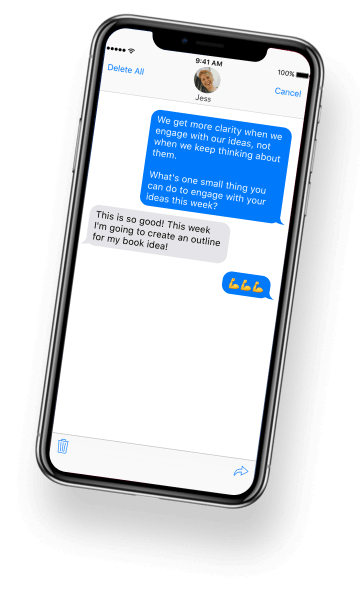
Episode #10
What’s Your Money Story?
- Categories: Personal Development
TUNE IN: APPLE PODCASTS | SPOTIFY | STITCHER
Show Notes:
Do you know your money story? While you may realize it, you've got one! In this episode, I'm diving into my money story, how it developed stress around money for me, and how that impacted my business. So sit back, and let's dive into your money story!
"What are you making your money mean about your self worth?"
Love/Hate Relationships with Money (1:32)
My Money Story (1:58)
Look at the numbers. What are they telling you? (4:18)
Understanding at KPIs and Patterns (4:39)
Separating Yourself from the Money (6:44)
Don't ask: 'What's wrong with me?"
Do ask: "What's wrong with the products?"
This Episode's One Liner: What are you making your money mean about your self worth? (8:00)
Links
Review the Transcript:
Hey everyone. So in this episode, we're going to talk about your money story. And you might be like, Jess, I don't have a money story. And I'm here to tell you that you do. And you're going to unpack it today. We all have a money story. Maybe it's a time when we realize that money has value, or maybe it's the first lemonade stand that we ever held, or the first coin that we ever put in our piggy bank. Whatever it is, we have created these beliefs around money.
Some of those beliefs that we should take with us, and others we should kick to the curb. And in this episode, I get into my personal money story, or train wreck of a money story. And I get much more deeper into it in Chasing the Bright Side. So if you're interested in checking out the book, head to chasingthebrightside.com or head to any local retailer and would love to hear what you think of it. But in this episode, we're going to talk about money. What it means to us, how it affects our self-worth, and get clear on what we want the story to be around the money that we're making and the money that we want to make in the future. So let's do it.
What's up everybody? It is Jess Ekstrom and welcome to Business On The Bright Side. The podcast, where you can learn how to make a living and make a difference at the same time. Life is short and so is my attention span, so let's get started. I'm sure I'm not alone when I say that I have a love/hate relationship with money. And I think that my money story, we all have money stories. The time when we first realized that it meant something in our life. And my money story is I would say a little bit unique.
And if you've read, Chasing the Bright Side, then you know what I'm talking about, but I'll tell you if you haven't. So I am related to someone who has done a very significant financial crime. And it was something that happened my senior year of high school. I've lived a very privileged life. I grew up in a great neighborhood. I went to a great school. My parents were wonderful. And it was something that I ... It just felt normal to me. And then it wasn't until that senior year of high school when this family member that I had was in the media everywhere.
And we realized that ourselves along with lots of other people had just lost every dime that they had. And I remember talking to my dad about it and he was like, it was like you felt like you were just about to graduate, and then you realize you had to go back to kindergarten. And that cut me so deep to think that you had to start all the way down the ladder and that they were doing everything right, and this money was just taken away from them. And so I think since then, I've had this belief that I have to gather it all while I can, because it's going to be taken away. And that money is a stressor. That whether you have it or you don't, it's stressful because of this thing that I experienced, and the heaviness that I had around money. So when it came to my business, I brought that same emotional stress that I had around money into Headbands of Hope and into my speaking and into this scoreboard that I was looking out of my bank account.
And I think that I let it take the fun out of running a business. I let it take the ingenuity out of running a business, because when you actually think about money and the dollars in your business, it's really not a scary thing. It should be a story. What are the numbers telling you? What is the story of your business right now? Because the numbers for me for so long were indications of what I thought was failure. If I wasn't crushing it, then I was failing. But if we take our ego out of it, then the numbers make our business black and white. So what if we changed our relationship with the numbers of our business? So with Headbands of Hope, we use Shopify to run our site. And Shopify generates all of these reports. And here's all the things that you need to know about your business.
Here's how many headbands you sold. Here's a different skew numbers. Here's your customers. Here's everything. Too much information to the point where I literally never hit the reports tab. And I'm like, as long as we're in the green and as long as I can pay my people, I'm good. I'm not even going to look. And then as I started getting other people involved in my business, I had to look. We had to run the numbers. And now every month we have a KPI meeting, our key performance indicators, where we look at the numbers and what they were that previous month compared to what they were that same month last year. And they tell a story. One time we had ... Our numbers were down, and we didn't know why. And we realized when we looked at these KPI reports that they happened, they started to decrease the moment we had an update that we installed on our site.
And we realized that that update that we installed on our site was providing this glitch at checkout. And it took us two, maybe three months to recognize this, which might seem like a long time, but in the grand scheme of things, businesses can go years without seeing those problems because they're not looking under the hood. So think about your relationship with money. What are you making it mean? What narratives are you packing around the dollars in your business? Or maybe it's the dollars that you're investing into your business right now, and you haven't seen that ROI yet. But taking the numbers, separating them from your ego allows you to look at your business separated from you. Which I know that a lot of times we think, but my business is me. I am my business, which yes, there are some parts of that, that can be true.
But if your personal identity is so woven into and just baked into how you think about your business, then you won't step back enough to look at the numbers, see the story and see where there might be problems. So for example, if I launch something or if I create something that isn't selling, I can ask myself two different questions. I can ask, what's wrong with me, or I can ask, what's wrong with the product? And the second question is what we should be asking ourselves. Not what am I doing wrong? What's wrong with me? But what is it about what I'm selling that isn't hitting?
Is it the sales page? Is it the cart? Is it the checkout is the problem? Is it just the wrong time? And so when we can separate ourselves from the money and actually look at it as if it's a story, we can make clearer decisions. And the reality is, is that you're going to have moments where you make a lot of money, and that's awesome. And you're going to have moments where you lose money. Both things are just a normal part of business. So I'm going to leave you with this. What are you making your money mean about your self-worth because your money and your self-worth are two completely different things. So don't try to blend the two.
Thanks for listening to Business on the Bright Side. I'm your host, Jess Ekstrom. For all the show notes, head to businessonthebrightside.com and be sure to tell me what you thought of this episode on Instagram. And if you're picking up what I'm putting down, subscribe and write a review wherever you consume podcasts. See you next time and keep chasing the bright side.







